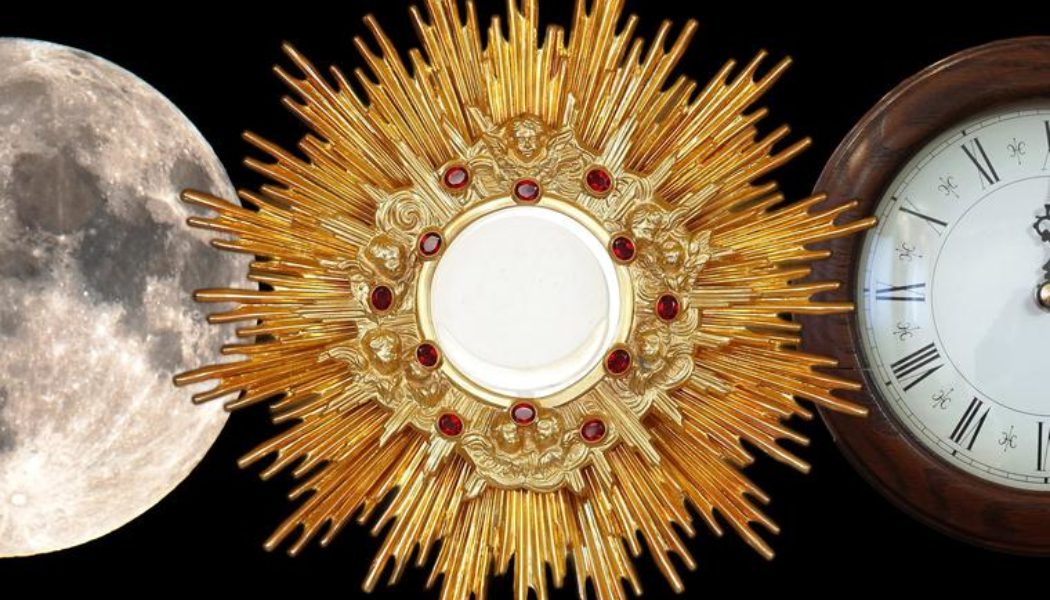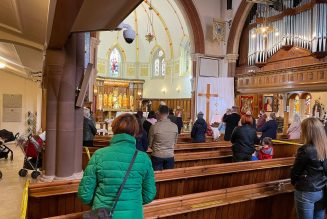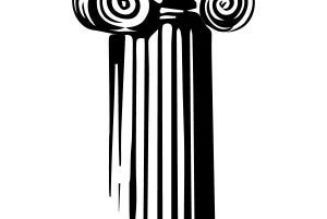
In April, the Biden administration called upon NASA to create a moon-based time standard.
The proposed lunar time zone would be known as Coordinated Lunar Time (LTC).
What the inhabitants of the moon think of this has not yet been recorded, but NASA’s imposition of “time” upon the earth’s only natural satellite prompts the question: What is time? As underlying NASA’s undertaking is the presumption that time belongs to man, and, consequently, that it is up to humanity to define what it is. With such a view, man not only presumes to regulate the flow of time here on earth — and also now on the moon — but does so because time is merely a human construct, reflecting humanity’s comprehension of the universe.
This cannot be a Christian understanding of time. Especially so, perhaps, as more than adherents of any other religion, Christians are conscious of time not as something meaningless or of our own making. Instead, it marks out the timeline of the truths of our faith: Creation, the Fall, the Incarnation, the Cross, the Resurrection, the End Times and the Parousia.
Pope St. John Paul II, writing in 1995 and conscious of the coming Third Millennium, stated: “In Christianity, time has a fundamental importance. Within the dimension of time, the world was created; within it the history of salvation unfolds, finding its culmination in the ‘fullness of time’ of the Incarnation, and its goal in the glorious return of the Son of God at the end of time. In Jesus Christ, the Word made flesh, time becomes a dimension of God, who is Himself eternal.”
If, then, of such “fundamental importance”: what does time mean for and in our lives as Christians? This is an especially pertinent question to an age that has grown used to the concept of “24/7”. For, like NASA in relation to the moon, humanity seems ever eager to control time. Human beings like to think that they are the arbitrators of “when”. Yet, increasingly, their ordering of time occurs within an environment in which all aspects of life — seven days per week, 365 days a year — are lived with no Off switch, and so no real control over time. In fact, the rise of the digital age has summoned the specter of a world where, not only is it always possible to be On, but that is the expectation. Seen, in particular, in the world of work, where, for many, post-COVID, it has begun to dawn that it is no longer the case that they have opted for the convenience of “working from home” so much as the endless servitude of “living at work.”
This new world-ordering of our time has produced a never-ending, relentless and exhausting dispensation.
But is that the way it is meant to be?
Through the ages, time has been ordered in human societies in myriad ways. However, from the fourth century AD and the Edict of Constantine, a Christian understanding of the temporal order placed Sunday, the Lord’s Day, at its center. That day was now deemed the hinge on which turned the week — and, by extension, time itself. Not only was the pre-eminence of Sunday a reordering of the week, but it also came with a decidedly different understanding of time itself. Sunday was a day distinct from all others: it was a day of rest from work. But the Edict was welcomed by Christians not so much because it offered respite from work on Sundays, but because it allowed them to observe the Lord’s Day with the due solemnity, prayer and joy that it deserved, required and represented.
Today, even in the most secular Western societies, the idea of Sunday persists as a day unlike any other. For many, Sunday endures in being a day when work yields to leisure activities. Even yet around Sunday, long stripped of any religious connotation, there remains a vague echo of the imperial edict from centuries past that freed people from the grind of the working week. The view today of some Catholics that Sunday is when you “have to” attend Holy Mass is equally a dull echo of earlier Christians’ celebratory joy, when they glimpsed and lived something of eternity in the Lord’s Day.
How we use time, how we live time, and how we sense its passing is important, therefore. But equally important is the need to recognize what time is revealing to us.
In 1998 Pope St. John Paul promulgated the Apostolic Letter Dies Domini — On Keeping the Lord’s Day Holy. It was written to counter the secular concept of “the weekend” — a growing negation of the centrality of Sunday to the week. In addition, the Pope wanted once more to reorder Christian life around Sunday as the preeminent Holy Day. To those of us living through the first decades of the Third Millennium, its message now seems more relevant than ever.
Although principally written about Sunday — its meaning and observance — Dies Domini is also a powerful meditation on the nature of time itself. “Sunday is the weekly Easter,” the Pope states, “Recalling and making present the day upon which Christ rose from the dead, it is also the day which reveals the meaning of time”. He then goes on to explain the significance of the Christian Sunday in that its difference springs from the Resurrection, for “it cuts through human time, the months, the years, the centuries, like a directional arrow which points towards their target: Christ’s Second Coming. Sunday foreshadows the last day, the day of the Parousia, which, in a way, is already anticipated by Christ’s glory in the event of the Resurrection.”
Dies Domini teaches that it is in and through Sunday that the nature of time itself is encapsulated. The day has its beginnings in the opening pages of Genesis. In the Sabbath of the Old Testament, it is the day of salvation. Then, in the fullness of time, the Jewish concept of the Sabbath gave way to its true cosmic meaning and fulfillment in the Resurrection, while pointing to the end of time itself. In his Sabbath rest, the Glorified Christ has truly become the Lord of history — “Everything that will happen until the end of the world,” teaches Pope St. John Paul, “will be no more than an extension and unfolding of what happened on the day when the battered body of the Crucified Lord was raised by the power of the Spirit and became, in turn, the wellspring of the Spirit for all humanity.” Encouragingly, what the Pope is saying is that there is no need to wait for another — better — time in which to live. We are already living in “end times” because Sunday is always the Day of Salvation.
In light of this, maybe one aspect of the solution to our woes — personal, communal and societal — is staring us in the face. It is to begin to live in time consecrated to the Divine Plan, and that means with the Risen Lord at its heart. This is the polar opposite of trying to control and manipulate time — or in NASA’s case manufacture it — all of which leaves us only feeling more alienated by its ultimate pointlessness. Therefore, the key to the transformation suggested by Pope St. John Paul is living Sunday in and through the newness of life wrought by the Resurrection. “Mankind can have only a faint intuition of this process,” he says, “but Christians have the key and the certainty. Keeping Sunday holy is the important witness which they are called to bear, so that every stage of human history will be upheld by hope.”
And at the core of keeping Sunday holy is having at its center “the source and summit of the Christian life”, namely, the Holy Eucharist. This is the moment, as the then Cardinal Joseph Ratzinger wrote, when the Church’s liturgy becomes “the means by which earthly time is inserted into the time of Jesus Christ and into its present. It is the turning point in the process of redemption. The Shepherd takes the lost sheep onto his shoulders and carries it home.”
Needless to say, the moon is oblivious to any “time zone” being imposed upon it. However, the moon’s seeming movement in time — its waxing and waning — continues to teach us. Unlike the sun, the moon appears, to the human gaze, at least, to rise and fall, and then to be reborn. In so doing it becomes a universal and constant sign of death and resurrection — “the moon perfect forever, and a faithful witness in heaven” — and thus, for those with eyes to see, and regardless of any manmade time zones, a part of the eternal cosmic symphony to the “first born of all creation.”








